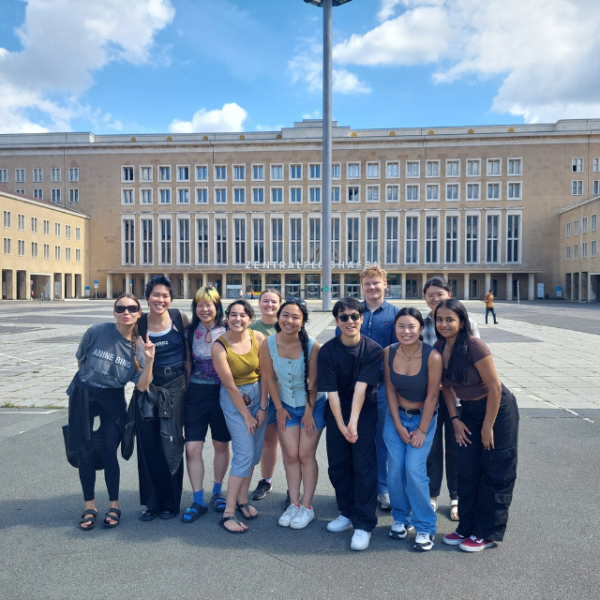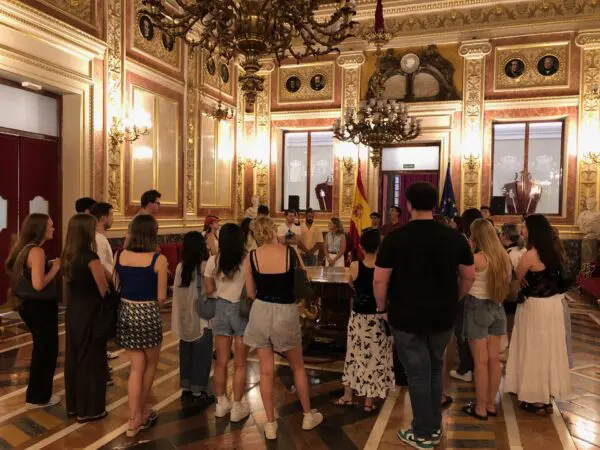
Barcelona, Spain
Service Design for Innovation
When:
14 July - 25 July 2026
Credits:
0 EC
Read more
Social Sciences Summer Course
When:
26 July - 23 August 2025
School:
Summer and Winter University FUBiS
Institution:
Freie Universität Berlin
City:
Country:
Language:
English
Credits:
6 EC
Fee:
1300 EUR

This course is about Berlin, the city that was at the epicenter of the defining catastrophes of the twentieth century, including the First World War, the horror of the Nazi era that resulted in the Second World War and the Holocaust, and the long grubby Cold War that saw the city physically divided between capitalism and communism in an embodiment of the conflict between the American and Soviet worlds.
Yet amidst these horrors (and arguably because of them), Berlin was also a place where some of the most boundary breaking avant-garde art, progressive politics and anarchic subcultures of the twentieth century bloomed and died in the furnace of its constantly changing social, political and economic turmoil.
The livid imprint of this tormented history marks Berlin up until today, and demands to be known, studied and understood,
With this urgency in mind, in this course we examine the history of twentieth century Berlin through various lenses: the biographies of individuals, the words of writers who bore witness to the vertiginous social, political and physical changes the city underwent, and buildings and monuments whose physical construction, destruction and reconstruction reflected the ideological turmoil and conflict of those immense hundred years.
Famous Berliners we will meet include the murdered Communist leader Rosa Luxemburg, the artist Käthe Kollwitz, the actress Marlene Dietrich, the Nazi filmmaker Leni Riefenstahl, the adopted Berliner David Bowie and the famous East German dissident musician Wolf Biermann. The contextualized stories of these individuals will offer us unique perspectives politically, artistically and socially into the tumult and struggle that marked their times in the city. These figures occupy a range of different position(s): as Berliners, as radicals, as artists of resistance to or collaboration with Nazism, and Communism, as drifters and exiles whose stories reflect Berlin’s unique position in the twentieth century as ‘no man’s land, frontier, a city adrift in the sands of Central Europe.’
In a similar way, we will examine the words of writers who bore witness to the extremism and societal upheaval that marked twentieth century Berlin. From the witnessing of Roth and Isherwood to life in Weimar and Nazi Berlin, to the social and political commentary by Christa Wolf on the moral struggles of life lived on different sides of the Berlin Wall, we will assess their writings in their historical contexts. We will assess their words as evocations of Berlin, but also as potential or overt acts of resistance to the extremism they lived under, that attempted to maintain a solidarity with the idea of Berlin as a place of artistic and social freedom and permissiveness.
Finally, we will examine some of the places in Berlin whose physical building, destruction and rebuilding can be situated in the wider systems of ideology, power and social relations that so cataclysmically defined the physical landscape of Berlin after 1933. In this, we will focus on the story of Potsdamer Platz, the Palace of the People (Palast der Republik) and the central site in Berlin for the mourning and remembrance of the Jewish Genocide by Nazi Germany, the Holocaust Memorial in Mitte.
This course does not seek to provide a ‘grand narrative’ of Berlin’s twentieth century history. Instead, it follows a thread that weaves through the history: the thread left behind by those who bore witness to their times. By tracing the stories of contemporary witnesses, left for us in books, films and songs, and in the physical construction of the city, we open up a human dimension that enriches and challenges our understanding of Berlin’s traumatic recent history.
Structured largely chronologically, the course will work with films and novels whilst building on a clear historiographical base provided in class seminars. The teaching will be augmented by physical excursions into Berlin to trace the stories we encounter and class discussions will form the basis for a seminar paper that students will be required to submit at the end of the course. This history course approaches the story of Berlin through the reflections and refractions of individual humans’ lives who struggled upon the immense stage of a city at the very symbolic and literal heart of the catastrophes of the twentieth century.
Dr. Lauren van Vuuren
This course is for university level students with open minds and incurable curiosity about the world around them.
Fee
1300 EUR, course fee
Fee
300 EUR, program fee
When:
26 July - 23 August 2025
School:
Summer and Winter University FUBiS
Institution:
Freie Universität Berlin
Language:
English
Credits:
6 EC

Barcelona, Spain
When:
14 July - 25 July 2026
Credits:
0 EC
Read more

Madrid, Spain
When:
13 July - 24 July 2026
Credits:
6 EC
Read more

Colchester, United Kingdom
When:
16 February - 20 February 2026
Credits:
4 EC
Read more